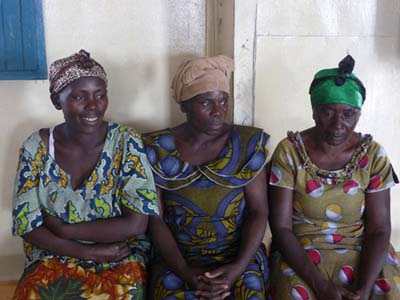March 8 marks the 100th anniversary of International Women’s Day. To commemorate the achievements and ongoing challenges women face in some of the world’s most devastating conflicts, Enough is publishing profiles each day this week of women doing exceptional work to end atrocities and support survivors in Congo, Sudan, and LRA-affected territory.

Immaculée Birhaheka began advocating for women’s rights in Congo two decades ago, a nascent concept at the time. In 1992 she founded an organization called PAIF which stands for “promotion and support of women’s initiatives” in Goma, the provincial capital of North Kivu.
In the early 1990s, Immaculée became acutely aware that the perspective of women was completely absent in both the public square and in family matters. Girls were not being raised to dream big and excel. Instead, they were being raised to eventually return to the kitchen to care for the husband. Through PAIF, Immaculée organized women to start advocating for political space for women in the public sphere. They focused on educating women about the law and enabling then to confront political authorities and discuss issues. They also began sensitizing the authorities about international law and human rights. It wasn’t long before Immaculée started to see positive results from her work empowering women.
Despite the increasingly insecure environment in which Immaculée was working, she continued to fight relentlessly for women. Following the 1994 genocide in Rwanda, Goma endured two violent invasions and became inundated with waves of displaced civilians who had been forced to flee their homes. It was around this time that Immaculée started to realize just how many women had been raped in the crossfire of the conflict. And then, through the course of her work, she met a family in which the grandmother, mother, and daughter has all been raped, independently, on three different occasions. It was this family’s story, which she still remembers to this day, that drove Immaculée to start focusing her efforts on rehabilitating rape survivors and publicly denouncing rape as a weapon of war.
Because of her outspokenness, Immaculée continues to receive death treats and has been arrested numerous times. Yet despite the risks, she is tireless in her efforts – she has held peace rallies, she has met with Congolese authorities, and she has consulted with international NGOs. She has even taken her cause to the African Union to denounce the epidemic of sexual violence. Believing that the Congolese authorities must act where the international court does not, Immaculée led a successful campaign to secure the passage by the parliament of a stringent law on rape in 2006. This law not only specifically criminalized for the first time, acts of sexual violence such as mutilation and slavery, and introduced stiff penalties for these crimes, it also demarcated the rights of the victims. Finally, the law began to recognize that rape is a crime and that survivors are not themselves criminals or condemnable.
Despite the challenges and risks that she faces on a daily basis, Immaculée still has hope for her country and its women. It's this hope that drives her to keep pushing for peace and the empowerment of Congolese women. Even more importantly, the thousands of women who dream for a better future for themselves and their children, and whose lives she has touched, find hope in Immaculée.
Other profiles in this International Women’s Day series: Lynn Nottage, Chouchou Namegabe, Melissa Fitzgerald, Tehani Ismail
The profiles highlighted in this series were compiled for The Enough Moment, a book by John Prendergast and Don Cheadle about engaged citizens – known and unknown, in the U.S. and abroad – who are mobilizing to help end genocide, rape, and the use of child soldiers in Africa. Visit the Enough Moment Wall to hear people describe their “Enough moment” and to upload a video, photo, or written testimonial of your own.

